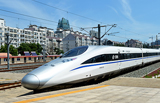Rise in soybean imports expected to continue
By Xu Wei (China Daily) Updated: 2015-10-27 07:11China's soybean imports rose 13 percent in the first nine months of the year, compared with the same period last year, and officials said the trend is likely to continue through the period of the country's 13th Five-Year Plan (2016-20).
In 2020, China will probably experience a 100 million metric ton shortage of domestic grains, according to Han Changfu, minister of agriculture. Most of the amount will be soybeans, he said.
In the first nine months of this year, China imported a record 52.8 million metric tons of soybeans, up by 13 percent from the same period last year, according to SCI International, a commodity market information service.
Data from the Ministry of Agriculture show that last year, out of China's 100 million metric tons of grain imports, more than 70 percent, or 71.4 million metric tons, was soybeans.
Imports accounted for 86 percent of China's total soybean supply last year, according to SCI data.
With the continuous decline of domestic produce, analysts said soybean imports were expected to continue to rise in the next five years.
The country's soybean imports were primarily used for pressing, and the need for soybeans as animal feed-a byproduct during pressing-on livestock farms was the main driver of the growth, said Lu Ning, an analyst of soybean production and imports with SCI.
The imports can only continue to rise with the growing demand for meat and dairy products in China, she said.
The price gap between international and domestic produce is the primary reason that agricultural processing companies turned to the international market, Lu said.
For domestic producers, the price of domestic soybeans stood at about 4,000 yuan ($630) per metric ton as of Oct 21, which is about 840 yuan higher than imported produce, she said.
Fan Shenggen, director-general of the International Food Policy Research Institute, an international food policy think tank, said, "Self-sufficiency in soybeans has already been gone for more than a decade in China.
"The increase in imports is not necessarily a bad thing. And the key is always to ensure that the Chinese people will have a safe and nutritious food supply."
- Leaders focus on growth at plenum
- China to buy more grain abroad, shift farming focus
- Yangzhou record for fried rice is revoked
- COMAC developing wide-body jetliner
- 100 million couples would be eligible under a universal two-child policy
- Seminar addresses humanitarian aid challenges
- New center to fight cross-border crime
- Program to boost medical benefits
- Taiwan's wartime resistance wins praise
- Stress, depression cool the Chinese passion for sex







